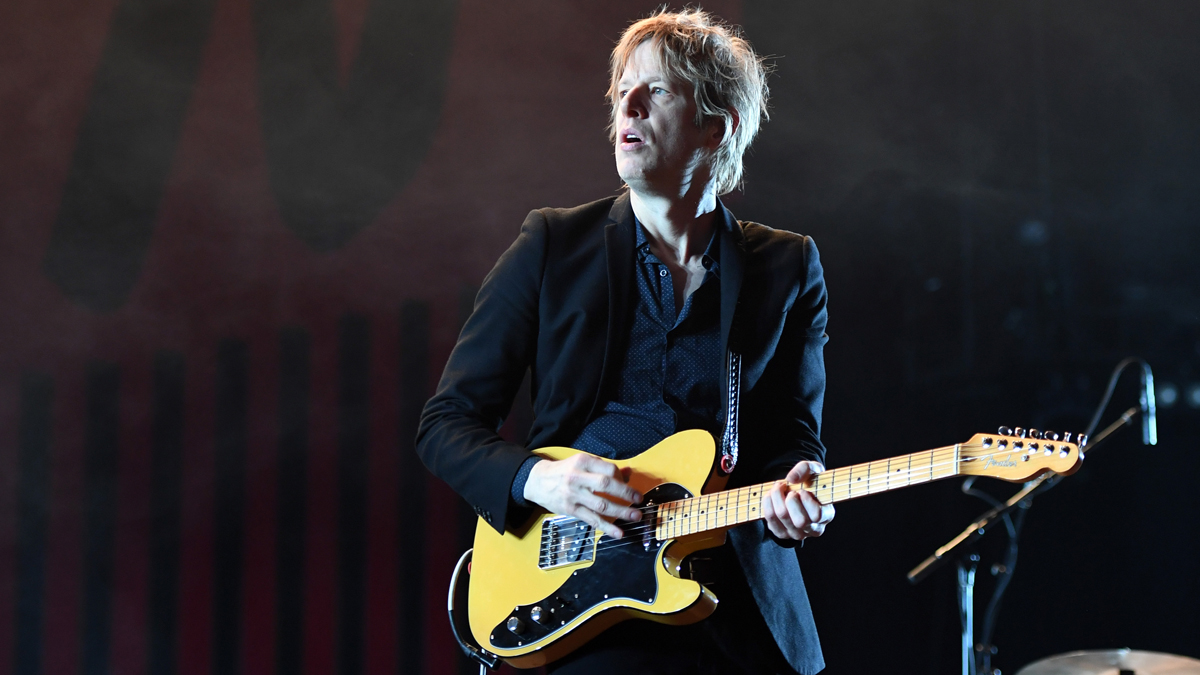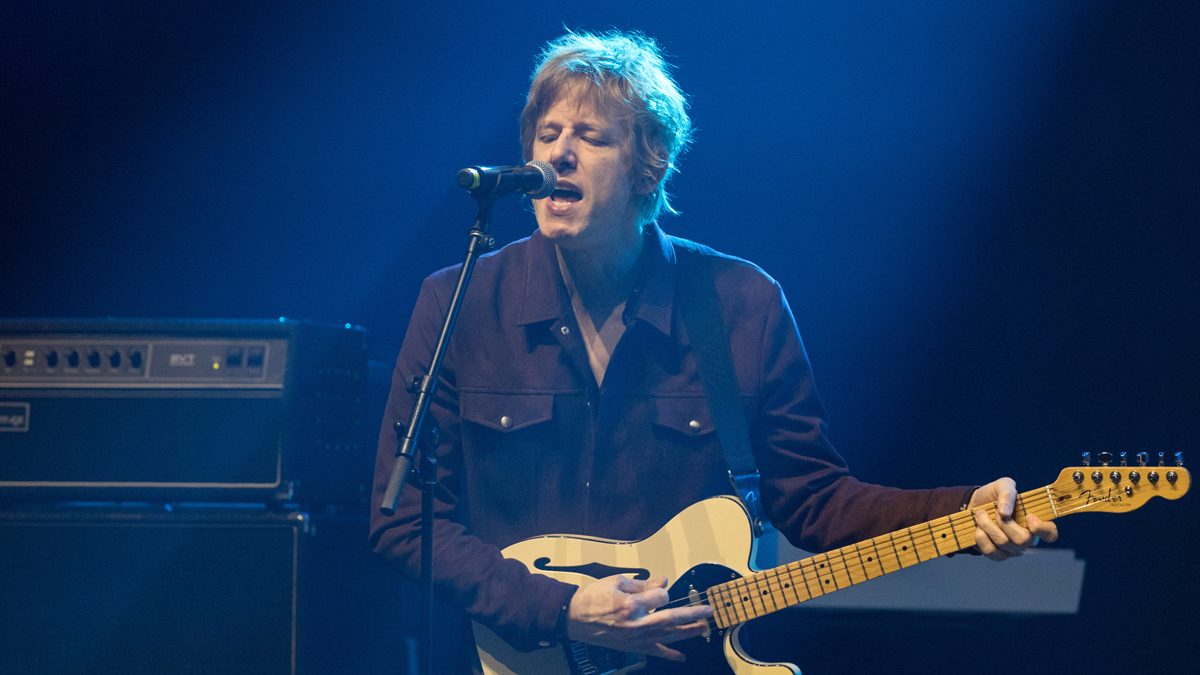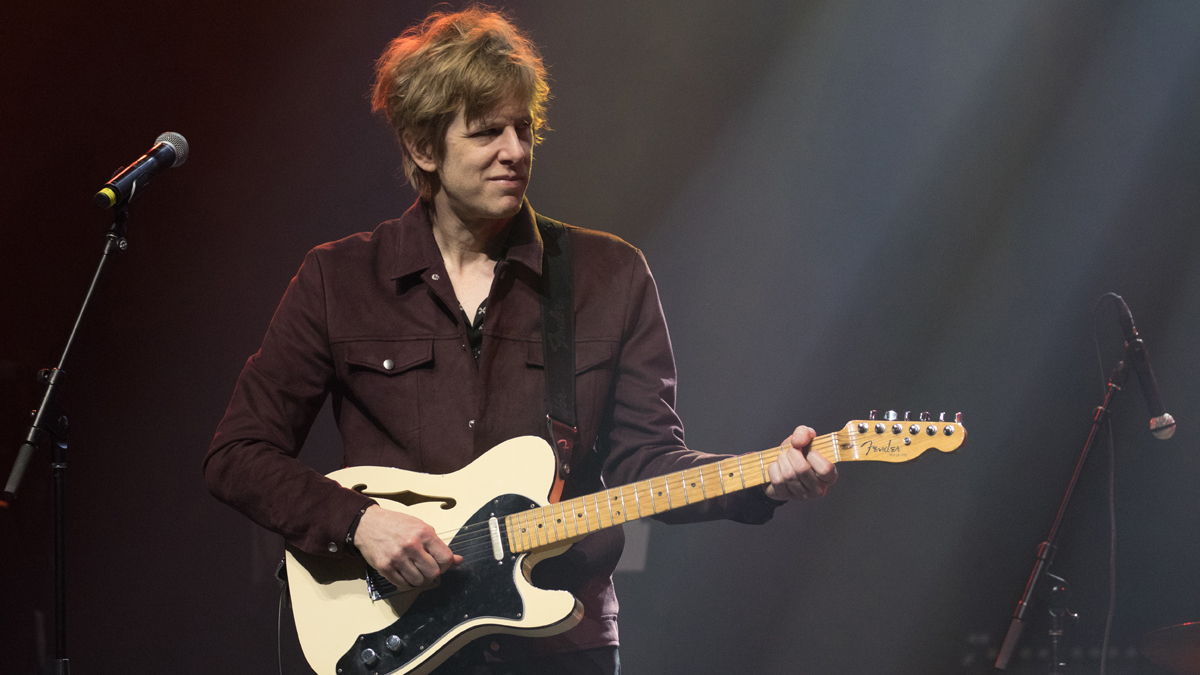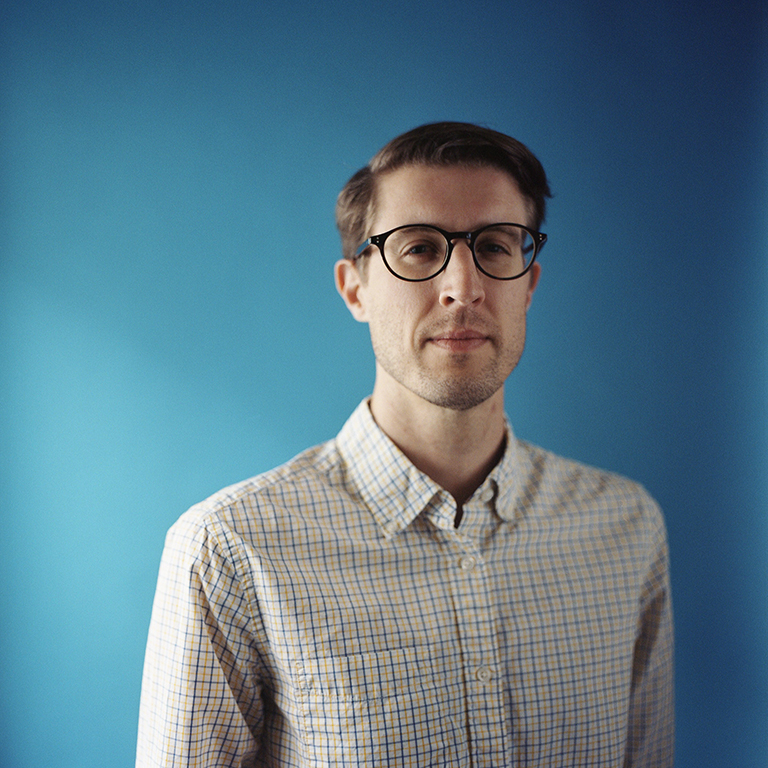Spoon's Britt Daniel: "My playing is all about the right hand. That’s my way of being expressive, by establishing a feel and rhythm"
Daniel discusses his role as a rhythm guitarist, why a Vox Pathfinder is his go-to amp, and dissects Spoon's latest LP Lucifer on the Sofa, from its back-to-basics approach to its "fuckin' ferocious" leads

Britt Daniel wanted to bring a back-to-basics grit to Spoon’s 10th album, Lucifer on the Sofa. This was in part inspired by the touring cycle behind 2017’s Hot Thoughts, where the act steadily stripped down the synth-and-ambient-sax-driven polish of their most experimental set of tunes in favor of an in-the-flesh rawness.
Geography played a part in things, too: Daniel, Spoon's lead songwriter, moved back to his home state of Texas in 2019, following stretches in Oregon and California.
Fittingly, Lucifer on the Sofa is also the first full-length from the quintet – currently comprising Daniel, drummer Jim Eno, guitarists/keyboardists Alex Fischel and Gerardo Larios, and bassist Ben Trokan – to be recorded in full at Eno’s Austin-based Public HiFi studio in more than a decade. Going back home revealed a few quirks to the two-floor home studio situated in Eno’s backyard.
“The performance room has really tall ceilings,” Daniel explains. “In fact, it’s kind of hard to tame that room at times, especially on the drums. It sounds big, so we have to make little houses with gobos around the instruments to deaden things at times.”
Despite deadening the room, there’s an undeniably lively feel running through Lucifer on the Sofa. Take its seismic, swagger-heavy cover of Smog’s Held, or the stylish sneer Daniel’s right hand brings on the Stones-y The Devil & Mister Jones. On Satellite, Fischel and Larios even go Guitar Hero with back-to-back bend-a-thons.
The album’s rowdiest moment is a sweat-slickened boogie by the name of The Hardest Cut. Imagine the band’s iconic The Way We Get By reimagined as a riff-roaring, ZZ Top-styled bump, performed behind a veil of chickenwire somewhere in a shack outside La Grange.
Daniel, Fischel, and Larios’ guitars collectively sound like they’re on the precipice of snapping as they wham into the chorus’ resolving, body-bowing drop D. Larios, who joined up with the band in 2019, further ratchets up the intensity with a spitfire fret-crawl unlike any lead in Spoon’s prolific catalog. All told, Lucifer on the Sofa makes for an extra gutsy outing from the always sterling Spoon.
Get The Pick Newsletter
All the latest guitar news, interviews, lessons, reviews, deals and more, direct to your inbox!
This record took a long time to make, and the pandemic made it take even longer. Maybe that's why it's so high-quality
“It took a long time to make, and the pandemic made it take even longer, but maybe that was good, you know? Maybe that’s why it’s so high-quality,” Daniel suggests.
Ahead of Lucifer on the Sofa’s release, Daniel shared details on the prolific writing sessions, tiny-but-tone-heavy amps, and the “fuckin’ ferocious” leads of Spoon’s latest album.

Outside of No Bullets Spent from your Best Of [2019’s Everything Hits At Once], it’s been five years since Spoon put out new music. How did that gap affect the making of Lucifer on the Sofa?
"I think we went through about 40 songs to come up with this record. A lot of those we went pretty far with. Some of them we finished and they’ll come out eventually; others we finished and I never want to hear them again. The basic answer is that it gave us time to have a hell of a lot of songs to pick from."
That’s interesting you had 40 new songs to choose from, but you start the album with a cover of Smog’s Held. How did you come to the cover, in general, but also the decision to have it kick off the record?
"That’s a song that we use to cover in the ‘00s at our shows. It was in the setlist for a year-and-a-half, or something. I don’t remember how it fell out; it’s just one of those things.
"It was time to start working on songs one day [while making Lucifer on the Sofa], and just to get us in the mood we played some covers. This was one of them. We hadn’t played it in years, and this time I switched to bass. Gerardo took the guitar. With that combo, it had some teeth to it that it never had before."
How did taking on bass put you into a different groove?
"It’s an instrument that I can play better by feel while I’m singing. It’s a little less technical. That [guitar] riff sounds fairly simple, but in order to play it right you’ve got to have some real swing. It’s hard for me to do that and sing at the same time, but not for Gerardo."
Spoon have done a number of covers over the years – like that David Bowie cover [I Can't Give Everything Away] you put out a couple of weeks ago. With Held in mind, does honoring the legacy of someone like Smog’s Bill Callahan ever come into play?
"I don’t think we set about to play it to honor his legacy, as much as I love Bill Callahan and his work. It’s just that after we played it for fun we thought, 'Holy shit, that was really good. Maybe we could actually record this, not just jam on it.' Then we did and it just had this sound that was fantastic.
"Jim had this idea of recording the drums and guitars twice, so you hear one [take] on the hard left and one on the hard right. That combo has a unique sound to it. Maybe that’s why it ended up being the first song; it’s just a good sound. And it has all that great banter at the top."
Like you said, it has that studio chatter blended up front. It gives the record an intimate vibe. Did this feel like a looser, in-the-room album as you were making it?
"That’s what we set out to do, for it to [sound like] a band playing together in a room. That’s the sound we were going for, one that maybe we hadn’t really done too much of on the last record or two.
This time it was about writing the song. We play it as a band, get to know it as a band, develop it, and then we hit record
"Especially Hot Thoughts, which was a lot of synthesizers, drum machines, and piecing-together songs as we were writing and recording them at the same time. This time it was about writing the song. We play it as a band, we get to know it as a band, we develop it, and then we hit record."
Let’s move from the groove of Held to The Hardest Cut, which has this scorching Texas boogie to it. This is an album that was made in Austin, fully, for the first time in over a decade. How did the move back home impact the sessions?
"The idea was to come back and make an album entirely in Austin. We had not done that for the last three records, really, since [2007’s] GaGaGaGa. Part of it was just the feel of Texas, all the cool stuff happening in Austin, where you can go out and see bands, take that energy and make your own music with it.
“The Hardest Cut was the first song that Alex and I wrote when he and I moved to Texas – I moved back, he was moving there for the first time. When we got off the highway we started writing this song, and it felt like Texas highway music, you know? I think there’s something to that. The state affected the sound of that one."

You’d previously said you were listening to a lot of ZZ Top in the lead up to making this album. Did you grow up with that specific kind of Texas boogie as you were coming up as a guitar player?
"I didn’t really play blues. When I was starting to play guitar, ZZ Top had just put out Afterburner, so they were in their sort of ‘80s sound. It had synths and sequencers in it – I guess not their most bluesy stage. I grew up in a small town [Temple, TX]. Even though it was pretty close to Austin, you couldn’t get an Austin radio station until right before I left. What I was mostly growing up with was Top 40, that’s what was convenient to me. There was no live music in that city.
"When I was learning guitar [though], it was based on the stuff that I liked. I had a lot of Beatles records that I had gotten from my dad, a lot of Stones records, and I was just getting into Led Zeppelin. Getting those Zeppelin records, I was backing the needle over and over again, listening to what was going on with each string that Jimmy Page was playing. It took forever, but that’s how I learned to play guitar."
Who’s carving it up on the solo in The Hardest Cut?
"That’s Gerardo. We talked about a few different approaches to that solo. The song kind of has the tempo of London Calling, and I think we went and listened to that a bit. There’s not really a proper solo on [London Calling], so I was just like, 'What about doing a Dave Davies kind of thing, where you just let it rip and come blazing out the gate with this flurry of notes.' And that’s what he did! It sounds great. We’ve never had a guitar solo like that."
Lucifer on the Sofa is the first Spoon album to be released since Fender issued your signature Thinline Telecaster. Was that your number one through these sessions?
"That’s the main one on this record, and there’s a lot of it. Every once in a while I’d branch out and use something else, but for the most part it was my Thinline Telecaster going through a Vox Pathfinder."
How did you arrive at that combination?
"It’s a good portable amp. When we would go to radio stations to do performances, I’d always bring one because it’s easy to carry. I have a ton of them sitting around the house.
"When I was working on the songs at home I would usually be playing through the Vox. [When] we were recording, I would have to separate it; we’d put it in a different room because it’s not as loud as the other amps. There was that hump to get over, but it’s got a great sound. You would never know that it’s coming from that tiny little amp."
What do you like about that signature Tele?
My playing is all about the right hand. That’s my way of being expressive, by establishing that sort of feel and rhythm
"There’s just something about that Thinline, with the way you can hear the pick scrape the strings. It’s expressive in that way. For me, what my playing is all about is the right hand. That’s my way of being expressive, by establishing that sort of feel and rhythm with the right hand. [The Tele is] good for me in that way in particular."
Despite Hot Thoughts having had a more experimental direction with its production and instrumentation, was there anything you drew out of that experience that went into Lucifer on the Sofa?
"We were definitely reacting against that record, and trying to steer in a different direction. It’s kind of fun to pick a new direction, you know? Like, ‘Okay, this is going to be our vibe this time.’ We decided that right up front.
"We toured quite a bit on Hot Thoughts, more than we had on any other record. As we were doing that, one after another we kept coming up with better versions of those songs.
"We started playing them better as a band. The tempos would change. We would change the form and the arrangements to the point where we played I Ain’t the One on TV, and when we were done, I was like, 'Guys, I really wish we had put that version on the record. It’s so much better.’ It’s because we never played the songs before we recorded them. So we just thought we would hash that out more in advance this time."
Was there anything else that went into the sculpting this time around, in terms of pedals or other gear?
"We use a lot of [Electro-Harmonix] Memory Man. We also used the JHS Colour Box pedal – it’s like they’re imitating a Neve board, basically; it’s pretty extreme. We used another little amp, this Benson Vinny 1-Watt guitar amp. It’s kind of like the Vox Pathfinder in a way, because it’s so small, but it has a different tone to it.
"Gerardo was playing a Mark Knopfler signature guitar that was given to Charlie Sexton by Knopfler – there’s a letter to Charlie in the case. Charlie works at the studio a lot, so he leaves instruments there. I know Gerardo used that, and he also has a ’64 Jaguar reissue that he uses a lot."
Gerardo has been with the band since 2019. How has it been integrating his playing style into Spoon?
"It’s amazing having someone in the band that can play in that way. For a long time I was the only guitar player in the band. It was largely about rhythm guitar. That’s my thing! I could do leads, but I’m not a great technical player.
"When I would do leads, they would have a certain style to them that you’re not going to hear on, say, a Stevie Ray [Vaughan] record. Now we have someone who can really play, and it’s great. We’ve never had a guitar solo like the one on The Hardest Cut before, and it’s fuckin’ ferocious. I love it."
- Lucifer on the Sofa is out now via Matador Records.
Gregory Adams is a Vancouver-based arts reporter. From metal legends to emerging pop icons to the best of the basement circuit, he’s interviewed musicians across countless genres for nearly two decades, most recently with Guitar World, Bass Player, Revolver, and more – as well as through his independent newsletter, Gut Feeling. This all still blows his mind. He’s a guitar player, generally bouncing hardcore riffs off his ’52 Tele reissue and a dinged-up SG.




![[from left] George Harrison with his Gretsch Country Gentleman, Norman Harris of Norman's Rare Guitars holds a gold-top Les Paul, John Fogerty with his legendary 1969 Rickenbacker](https://cdn.mos.cms.futurecdn.net/TuH3nuhn9etqjdn5sy4ntW.jpg)






